
Interview Date: 10/11/2010
Run Date: 04/14/2011
Interviews Home / Movies Home / Bullz-Eye Home
Way back in October 2010, the New York Comic-Con offered up a look at a film that was, for all practical purposes, an unknown quantity: "Hanna," a film about a teenage assassin, starring Eric Bana, Saoirse Ronan, and Cate Blanchett. Sure, it sounded cool, and it was hard to complain about the cast, but, still, no one knew much about it. By the time the panel for the film was over, however, there was considerable buzz…and that buzz only got louder later in the evening, when a handful of journalists – including yours truly – were provided with the opportunity to meet, greet, and eat with Bana, Ronan, and their film's director, Joe Wright, whose most recent film at the time was "The Soloist." The volume grew progressively louder as the attendees took advantage of the temporarily-open bar, but I was fortunate enough to have a few minutes with Mr. Wright and his actors while those of us of legal drinking age were still able to hold a sensible conversation. (No, Ronan wasn't drinking. She's only 16, for goodness sakes!)
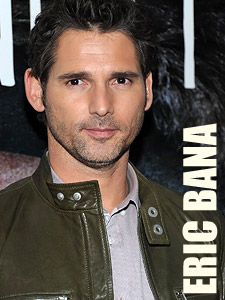 Bullz-Eye: First of all, I've got to tell you that I loved you in "Funny People."
Bullz-Eye: First of all, I've got to tell you that I loved you in "Funny People."
Eric Bana: Thank you! That was good fun.
BE: Did you enjoy the chance to do some comedy for change?
EB: Yeah, it had been a long time, and it had taken that long to find something to do, you know? And I jumped at the chance. It read hilariously, and it was hilarious to be a part of. It was great.
BE: You and Leslie Mann had some fun chemistry.
EB: (Laughs) Yeah, we did.
BE: So how did you find your way into "Hanna"? Did Joe Wright come looking for you, or did the script land in your lap and you found it interesting?
EB: No, Joe was already attached when I read it, so I knew he was directing…
(At this point, one of the servers comes by with a tray full of…well, honestly, it's been so long that I don't remember what was on the tray, but it doesn't matter now, and it didn't matter then. Listening to the tape, you can hear Bana interrupt the server before she can get past the words, "Would you…?" "I'm going to try everything," he said. "Everything.")
EB: So, anyway, it was greenlit, I think, when I read it. I'm pretty sure. But I loved it. I thought it was unbelievably original, which is becoming the hardest thing to find, as well as being greenlit. It was an irresistible combination. (Laughs) So, yeah, it was great. I had a great time doing.
BE: How's your Finnish?
EB: (Grins) I don't have to speak it. I tried, with a little Vodka, but I never quite got there. I wasn't there long enough.
BE: So tell me a little bit about your character. I know he's a CIA agent…
EB: Yeah, he's kind of interesting, because he's a very mysterious character. At the beginning, we don't really know who he is or where he's from. The movie opens, the characters are very mysterious, and things are revealed slowly. It was fun sort of playing with that. He's an ex-CIA guy from Czechoslovakia who has gone underground for good reasons, and he's in the forest, training his daughter to be a killer.
BE: How easy or difficult was it to find that father/daughter chemistry between yourself and Saoirse Ronan?
EB: Well, look, I'm from Australia, she's from Ireland, our sense of humor is almost the same. She's very cheeky, which I love. We had a great time.
BE: Given that you've played Bruce Banner, I presume this is not your first Comic-Con experience.
EB: It was, actually! I'd never been to Comic-Con before. I missed out on "Hulk." But it was amazing. I had a good look out over the floor, and it looked like everybody was having such a great time. I've never seen so many people enjoying themselves so much. Normally when I go to events like that, I go to car shows. I go to a lot of car shows. People don't enjoy themselves as much. It's, like, a quieter appreciation. But everyone looked like they were having such a great time. I was jealous.
BE: Did you have any close encounters with anyone dressed as the Hulk?
EB: No, I didn't see any. I should've looked around longer. (Laughs)
BE: What were your thoughts about "Hulk"? Were you happy with the way it turned out?
EB: I loved it.
BE: Were you disappointed with the reception?
EB: Definitely. Well, not the reception of the film, but the reception of the box office, which people applied to the film. But, you know, it is what it is. The only thing that counts in this business is how things hold up five years later, ten years later. And I think the film holds up very well. That's more important to me than what people say at Week 2.
BE: Did you enjoy the opportunity to play a villain in "Star Trek"?
EB: It was awesome. Getting to work with J.J. (Abrams) was just a dream come true. I absolutely loved being Nero and had the greatest possible time. And just to get the chance to play a character like that in a movie like that, with all of those prosthetics… (Laughs) It was an iconic opportunity, and it was not lost on me. I really appreciated it.
BE: Did you actually get to work with Leonard Nimoy? I can't recall how the scenes played out, if they were filmed in such a way that you didn't need to be in the same room at the same time.
EB: I got to do one scene. We had one moment together, where we didn't talk, in a flashback sequence. So I didn't really get to work with him, per se, but I did get to work with him, and he's a pretty amazing guy.
BE: What would you say is your favorite project that you've worked on that didn't get the love you thought it deserved?
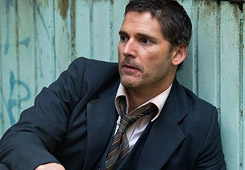 EB: (Long pause) I don't know! It's a good question, but…I don't know. You always hope they get loved, but they're all the same to work on. You put the same amount of work into all of them…
EB: (Long pause) I don't know! It's a good question, but…I don't know. You always hope they get loved, but they're all the same to work on. You put the same amount of work into all of them…
(Another food tray comes by, leading Bana to say, "Let's try this one now…" There is an audible "mmmmmmm" on the recording. Upon finishing the tasty tidbit, it becomes clear that he has no further response to the question at hand.)
BE: How was the experience of doing "The Time Traveler's Wife"?
EB: Awesome. Every part of it. Rehearsal, shooting…all of it. Great people. Working with Rachel (McAdams), (director) Robert Schwentke…awesome.
BE: Had you read the novel before tackling the film?
EB: Yeah.
BE: Were you happy with the transition from page to screen?
EB: Thrilled. Yeah, I thought it was a very, very hard novel to adapt, and I thought they did an amazing job with the screenplay. And I loved the movie. Absolutely loved it. I loved what Robert did with it. I was very happy with it.
BE: So what else do you have on your plate after "Hanna"?
EB: At the moment, I've got a few things in development. It's just a matter of which one gets up first, basically. So we'll have to wait and see. I don't know yet what I'm shooting next.
BE: Can you speak to what the possibilities are?
EB: There are a few. We'll just have to see which one will come first.
(Post-script: The winner, if we can trust IMDb, would seem to have been "Blackbird." Originally entitled "Layover," Variety describes the film as centering "on a single father in hiding who loses his teenage daughter during a layover in Las Vegas and is forced to confront the demons of his deadly past." Other cast members include Olivia Wilde, Kate Mara, Charlie Hunnam, Sissy Spacek, Kris Kristofferson, and Treat Williams.)
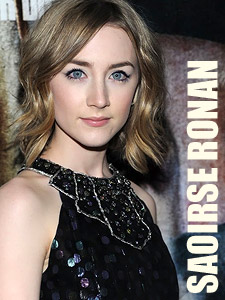 Bullz-Eye: It's a pleasure to meet you. I've been a fan since "City of Ember." I really loved that movie.
Bullz-Eye: It's a pleasure to meet you. I've been a fan since "City of Ember." I really loved that movie.
Saoirse Ronan: Oh, thank you! I'm so glad!
BE: My wife and I went to see it, and…I've got a 5-year-old daughter, and I don't think she's quite old enough to appreciate it, but once she is, I think she'll enjoy it.
SR: Oh, good, I'm glad. Yeah, I think that film should've done better. I think it deserved to. It was a good film.
BE: It was…I guess you wouldn't really call it a film for adults, per se, but I'm an adult, obviously, and I enjoyed it, as did my wife. (Laughs) It's just a fun film that the whole family can watch.
SR: Yeah, I think so, too!
BE: So how did "Hanna" come about for you? Did Joe Wright approach you, or did the script fall into your lap, or…
SR: No, I actually got involved before Joe. Focus sent me the script, and I really liked it, and liked the idea of doing something so different to what I had done before. I always want to make sure that I try something different. And, you know, it was an action film, and I think I was ready to do one. And I've always been kind of athletic and stuff. So I agreed to do it, and…they didn't have a director attached, and I went from meeting with the head of Focus, and when they told me that they didn't have a director, I said, "Well, why don't you send it to Joe and see if he wants to do it?" Because I knew that he could do it, you know? Even though he hadn't done anything like that before, I knew that he'd be able to do it and make it his own. And I think it was good for both of us to do something like that.
BE: To sort of deal with the learning curve together?
SR: Yeah, and especially together, 'cause when you think of the two of us together on "Atonement," and then to do something like this that's so different? It's great!
BE: What was the biggest challenge for you?
SR: Well, Hanna's one of those characters, she's not really bad-ass. You know, the way you see a lot of bad girls when they're assassins or they kill people, and they're really kind of cool and confident and sort of comic-book style? She's not really like that. She's very innocent and very calm when she kills. She's kind of like an animal, the way an animal hunts down its prey, which was really interesting. So that was something I enjoyed doing. It was a bit of a challenge, 'cause in your mind, you just expect that she'd be confident, but it seemed very important to Joe to have that kind of mood within her. So that's what we did. And I think it's more interesting that way.
BE: Did you have to practice how to handle a weapon properly?
SR: Yeah, but I didn't practice that much. Like, I went to a holding range in Berlin, and this guy showed me how to use…well, the first gun I had to use in the film – 'cause I had to use a few different guns – was a 1908 Luger, which is so difficult to use. And the film that I'm doing right now ("Violet & Daisy"), I'm also using guns, and I told the guy, "In the last one I did, I used a Luger," and he's, like, "That's one of the most difficult guns to use! They really put you through it by giving you that gun!" And then we were in Finland as well, and our fingers wouldn't work properly, and I had to pull back this thing, and… (Starts to laugh) That was a really big challenge!
BE: Aside from your finger issues, how was Finland?
SR: Ah, it was so beautiful. Have you ever been there?
BE: I haven't.
SR: It's really gorgeous. I mean, I think I'd go back there again for a week or something, just to have a look around, 'cause it's so stunning. You'll see in the film, like, we're on a frozen lake, and we actually did a fight sequence on a frozen lake. Yeah, and there's these big, beautiful, tall evergreen trees that have snow all over them, and it's sort of encrusted throughout the winter, which just made it look like it was from another world. It was really beautiful.
BE: So it was an actual frozen lake, then?
SR: Yeah!
BE: Were the film's insurance agents standing by at all times?
SR: (Laughs) Yeah! Everyone was kind of, like, "Uh…" There was practice every now and then. I mean, it wasn't like we were gonna fall through, because it was, like, several inches think. But then there would be a hole every now and again, and you'd be able to see down, and…my mom was freaking out when we went out there. (Laughs) It was kind of weird at first, 'cause…I mean, you're on a frozen lake! It's a bit scary!
BE: I asked Eric how his Finnish was, and he seemed pretty relieved that he didn't have to speak it during the film.
SR: (Nodding) That's a tough language. Even the accent is really weird. It's a really weird sound. Like, it's very Scandinavian, you know? Even the place names. I think we were close to where the volcano erupted. Yeah, it was around the same time we were there, maybe a little bit after us, and it's just, like, these really long words, letters together that don't make sense, and…I just don't get it! (Laughs) But they're lovely people. Really nice.
BE: So where in Ireland are you from?
SR: (Hesitates) That's actually an interesting question, because I was born in New York! I was born in the Bronx, and then when I was about three and a half, we moved back to Dublin for a couple of months, and then we moved…well, we pretty much moved to Carlow, which is in the southeast. It's in the country. And I've been there ever since. But…I don't know, 'cause my mom and dad are from Dublin, I kind of feel like a Dub. (Laughs)
BE: I was fortunate enough to go to Belfast earlier this year, which is my only experience in Ireland, but it was fantastic.
SR: Oh, Belfast is such a great city, isn't it?
BE: It is. And it was interesting, because they were so thrilled to have Americans there. Our guide said, "Well, you have to understand: we didn't exactly have the most booming tourist trade for quite a few years there, so we're really happy to have anyone who wants to come visit us!"
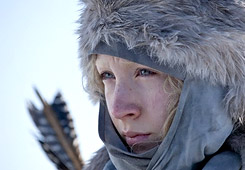 SR: Well, like, they went through a really tough time up there. A lot went on there. And there's still a good bit going on between Catholics and Protestants and all that kind of politics. But it's such a great city. It's really great, and the people there are really lovely. What did you do while you were there?
SR: Well, like, they went through a really tough time up there. A lot went on there. And there's still a good bit going on between Catholics and Protestants and all that kind of politics. But it's such a great city. It's really great, and the people there are really lovely. What did you do while you were there?
BE: I took a tour of the Bushmills distillery. There are worse reasons to go, I suppose. (Laughs)
SR: (Laughs) I'd say!
BE: Oh, I'd wanted to ask you: what would you say is your favorite project that you've worked on over the years that didn't get the love you thought it deserved?
SR: There have been a couple. I mean, "The Lovely Bones" is a very special film to me. I love the film, and I loved working on it. I think it deserved a little bit more recognition than it got, but it was still…I think that anybody who saw it was touched by it, so I was glad about that. And even though it was slightly smaller than we all expected, the people who it affected, it really affected deeply. So that was good. I mean, it was the way we wanted it to be. And, also, "City of Ember" as well. That was a great film, and it was based on a great book that loads of kids loved and that they read in school and stuff.
BE: I feel like it's destined to become a cult film one of these days.
SR: Yeah, I hope so! Every now and again, kids come up to me and they say, "Oh, I love 'City of Ember,' it's my favorite film!" So I'm glad about that, 'cause, y'know, it's a bit dark, it's kind of different…
BE: But, then again, so was the original "Willy Wonka and the Chocolate Factory, " and that's considered a classic.
SR: You're right, actually. Yeah, it is! So maybe they'll come around to "City of Ember" yet! (Laughs)
(Post-script: Although either the recorder wasn't on or the recording remains unlabeled and has gone MIA as a result, I have no audio record of an additional chat that Ronan and I had later in the evening. I mentioned that I was a fan of the TV series "Proof," which she'd done when she was really, really young…like, when she was only just into double digits. She didn't really have any insights to offer into the production, but she was positively astonished that I'd seen it, and as a result, we ended up just kind of idly chatting about this and that for several more minutes. A very sweet girl, that one.)
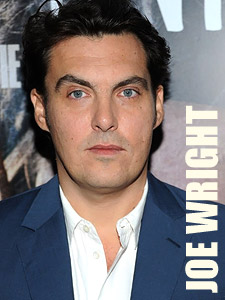 Bullz-Eye: I feel like I'm starting out all of these interviews by telling people how much I love something other than the film we're talking about, but it's not like I have any choice! So let me just say that my wife and I really enjoyed "The Soloist."
Bullz-Eye: I feel like I'm starting out all of these interviews by telling people how much I love something other than the film we're talking about, but it's not like I have any choice! So let me just say that my wife and I really enjoyed "The Soloist."
Joe Wright: Oh, thank you!
BE: Of course, my wife works with autistic children, so she probably enjoyed it on a completely different level than I did, but even so.
JW: Well, good, good. I had an amazing time working on the film, especially working with the community on Skid Row, the large majority of whom have mental health issues. That was…it was really a very expensive piece of community filmmaking.
BE: What was your knowledge of mental health issues before tackling the film?
JW: Not so much the political issues. I had some knowledge of the emotional issues. Some friends of mine, as everyone has friends who've suffered from these difficulties. So in a way, that's one of the reasons why I wanted to make the film: to see what really laid behind the illnesses and get a chance to do the research. A lot of the films I make are often made to see what I can learn, basically.
BE: As a journalist, I couldn't help but think as I watched the movie that there must have been more of the storyline about the decline of the journalism industry that we didn't get to see.
JW: Yeah, there was originally, and it kind of…through the script development process, the story became more and more honed toward the emotional relationship rather than the newspaper industry. Which is a shame.
BE: Yeah, because as I was watching, I felt like there was, like, 30 minutes of storyline about the current situation within the newspaper industry that had to be cut for time.
JW: Yeah, well, at least you had the feeling that it was happening just off-frame. (Laughs)
BE: With "Hanna," from talking to your actors, I learned that Saoirse was actually on the film before you were. How did you finally make your way to the picture?
JW: Well, I had a relationship with Focus Features, who had released "Atonement" and "Pride & Prejudice" in the States, so I kind of knew them a bit, but Saoirse was already on board, and…I think it was Saoirse who suggested me for it! So it was a strange reversal of fortunes…and a lovely one! And I must admit that, knowing she was on board, I paid more attention than I might have to the script. And once I read it, I was kind of very intrigued by the character of Hanna. I'm a big fan of films that…well, like, Hal Ashby's "Being There," or "E.T.," or even "Tarzan," really…characters who kind of have no experience of civilization and who are then taken and dropped into the middle of it and how they affect the world around them. And Hanna's a character like that, having kind of grown up in seclusion from the world. She then goes off on this odyssey, and…I kind of like those characters a lot.
BE: Actually, Saoirse was saying that it was a change of pace for both you and her to do an action film.
JW: Absolutely. And, also, the other thing is that I was really intrigued to do action. I'd never done any action before, obviously, and it scared me a lot… (Laughs) …and I often like to take on projects that scare me, so I can see if I can overcome my fears.
BE: So what did you find was the biggest challenge of doing this?
JW: Certainly the action. Certainly. It was a whole new way of thinking for me. And it's pure cinema action, you know. It's…you couldn't do it in any other art form, so it's very exciting from that point of view. But, yeah, you know, I tried not to just rely on second-unit. A lot of action films these days, I think, just have great second-unit directors who shoot all the action, and I really wanted to do it myself and see what I could learn.
BE: Given that you hadn't really done this sort of thing before, were you considering anyone else's style when formulating how to film the action sequences?
JW: No, not really. I just tried to see it as dance, really, and how you'd break down a dance. It's just theatricality. I guess Hitchcock, in terms of the tension and suspense of the more thriller moments. When you…I don't know if you saw the scene with Cate (Blanchett) at Comic-Con today, but it was all about suspense rather than action, I suppose. And then the physical fighting stuff, I was influenced by our fight choreographer, I guess, and he's a genius called Jeff Imada. He taught me a lot.
BE: Throughout the process, was there ever a point during the choreography, as you call it, where you felt comfortable doing it, or did it still feel challenging throughout?
JW: No, by about the third fight sequence, I think, I sort of went, "Oh, this is quite simple, really," and I hit my stride. But the very first fight sequence, we shot on a frozen lake in a temperature of minus thirty-five degrees, and that was terrifying, 'cause not only were we trying to deal with the fight choreography and how to stage it, but also in those kind of conditions.
BE: Yeah, I asked if Saoirse if the insurance men were onsite at all times.
JW: They weren't anywhere to be seen.
BE: Really?
JW: Yeah! They wouldn't have gotten out of the car even if they had been there. It was way too cold for insurance men. (Laughs)
BE: How do you enjoy working on a modern-day piece versus a period piece? Do you enjoy the opportunity to flip back and forth?
JW: Yeah, I do, although in a way, "Hanna" isn't really a modern-day piece, because it's a fantasy. What I love about working on period-work films is that they really allow you to visually play and really…you know, you can be a lot more imaginative and create worlds. And so I was kind of able to do that with this as well. I mean, the second clip you saw today, I doubt that CIA holding cells are really like that… (Laughs) …but, you know, we were really able to play with the idea of it being a fantasy.
BE: I wanted to ask you a little bit about your TV work, specifically "Bob and Rose." Did Russell T. Davies just spend all day going, "One day, I'm going to do 'Doctor Who.' I really am, I swear!"
JW: (Laughs) No, he never would've imagined it! I was very surprised when I heard he was doing that. I learned a lot off Russell, though. He's a lovely man and a great writer. And he has an amazing affinity with his audience, Russell. I remember silly things…well, not silly, really. Very sensible, reasonable things. Like, he often writes most of the drama to take place at night, 'cause he thinks that's when people are watching TV, and so it's easy for the audience to take place that it's happening right now. Stuff like that. I really like that idea.
BE: Would you go back and do TV if the opportunity presented itself?
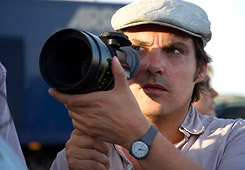 JW: I would, and I have. I don't see that much difference, really. I found television quite frustrating in terms of the sound design, because you're mixing your soundtrack to come out of a tiny four-inch speaker, maybe. So technically, in terms of the craft, cinema allows you a broader canvas. But television…in fact, I'm actually considering doing some next year.
JW: I would, and I have. I don't see that much difference, really. I found television quite frustrating in terms of the sound design, because you're mixing your soundtrack to come out of a tiny four-inch speaker, maybe. So technically, in terms of the craft, cinema allows you a broader canvas. But television…in fact, I'm actually considering doing some next year.
BE: Can you speak to what it is?
JW: No, in case I don't do it. (Laughs) But it'd be a bit of British television.
BE: Fair enough. I wanted to ask you about "The Last King," as I'm a big fan of Rufus Sewell.
JW: Oh, yeah, I love Rufus. Yeah, that was a very liberating project for me, 'cause it was my first period piece, and 'cause I could really bring my love of fairytale to it. And there were lots of limitations on it, financially and in terms of production, so we weren't able to film in the great palaces around Britain, which are actually quite expensive. So we had to use our imaginations a bit more, and it was great fun.
BE: Is there a particular project that you've worked on over the years that didn't get the love you thought it deserved?
JW: "The Soloist." Yeah. I don't know that it's my favorite project, but it didn't get the love it deserved.
BE: How was it working with Downey and Foxx? I mean, those are some big names right there.
JW: Incredible. And challenging at times. They're both very, very different. Robert's completely crazy, and he was playing the sane guy, and Jamie's completely sane, and he was playing the crazy guy! (Laughs) So it was an interesting process. But, you know, I often feel like I'm the luckiest guy in the world. I love theater, and when I'm working, I get to be an audience member of one and have the best seat in the house and watch great actors work. It's a lovely, very privileged position to be in.
You can follow us on Twitter and Facebook for content updates. Also, sign up for our email list for weekly updates and check us out on Google+ as well.











